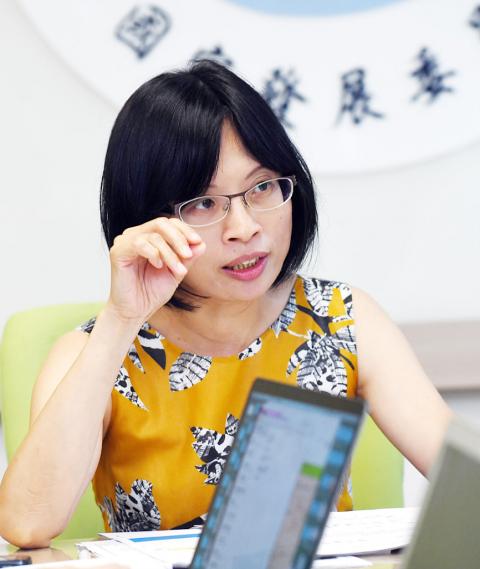Taiwan’s economy is losing momentum, veering away from an earlier course of recovery for this quarter, as global trade conflicts flare up without solutions in sight, the Munich-based Ifo Institute for Economic Research said yesterday.
The institute’s World Economic Climate index worsened from minus-2.4 to minus-10.1 for this quarter after experts revised downward their assessments and expectations in advanced economies and in Asia’s emerging and developing economies.
The think tank’s figure for Taiwan shed 9.1 points to minus-21.8.

Photo: CNA
“The economic climate deteriorated in all regions because the intensification of the trade conflict is having a considerable detrimental effect on the world economy,” institute president Clemens Fuest said.
The gloomy appraisal was assembled from the institute’s survey of 1,173 experts in 116 countries last month, with Taiwan’s evaluation being drawn from data compiled by the National Development Council.
Positive values indicate expectations of improvement, while negative points suggest deterioration.
The research body previously expected Taiwan’s economy to rebound this quarter, but has now adopted a neutral outlook for the next two quarters.
The conservative turn bucked the nation’s stronger-than-expected GDP growth of 2.41 percent last quarter and the arrival of the peak season for technology products.
US President Donald Trump recently announced a 10 percent tariff hike on US$300 billion of Chinese goods, including notebook computers and smartphones, from Sept. 1.
Experts have much weaker outlooks regarding trade growth, expecting global trade to drop to the lowest level since the outbreak of the trade conflict last year, the institute said.
Weakening global trade hurts Taiwan, home to the world’s largest suppliers of electronics, National Development Council research director Wu Ming-huei (吳明蕙) told reporters.
“The findings might have turned out softer if the experts had the possibility of factoring in the upcoming tariffs,” Wu said.
The survey contained positive views of the nation’s exports, imports, capital expenditures and consumer prices for the second half of this year, but expected stock prices, interest rates and the local currency to decline.
Wu attributed the expected improvement in exports to order transfers and the return of production lines to Taiwan from China.
The government has approved 106 applications from Taiwanese businesses for capital repatriations valued at NT$537 billion (US$17.1 billion), with NT$170 billion to be realized this year, Wu said.
That would translate into a need for new factory and office buildings, as well as workers, Wu said, adding that public infrastructure projects would also benefit the economy.

Taiwan Semiconductor Manufacturing Co (TSMC, 台積電) last week recorded an increase in the number of shareholders to the highest in almost eight months, despite its share price falling 3.38 percent from the previous week, Taiwan Stock Exchange data released on Saturday showed. As of Friday, TSMC had 1.88 million shareholders, the most since the week of April 25 and an increase of 31,870 from the previous week, the data showed. The number of shareholders jumped despite a drop of NT$50 (US$1.59), or 3.38 percent, in TSMC’s share price from a week earlier to NT$1,430, as investors took profits from their earlier gains

In a high-security Shenzhen laboratory, Chinese scientists have built what Washington has spent years trying to prevent: a prototype of a machine capable of producing the cutting-edge semiconductor chips that power artificial intelligence (AI), smartphones and weapons central to Western military dominance, Reuters has learned. Completed early this year and undergoing testing, the prototype fills nearly an entire factory floor. It was built by a team of former engineers from Dutch semiconductor giant ASML who reverse-engineered the company’s extreme ultraviolet lithography (EUV) machines, according to two people with knowledge of the project. EUV machines sit at the heart of a technological Cold

Taiwan’s long-term economic competitiveness will hinge not only on national champions like Taiwan Semiconductor Manufacturing Co. (TSMC, 台積電) but also on the widespread adoption of artificial intelligence (AI) and other emerging technologies, a US-based scholar has said. At a lecture in Taipei on Tuesday, Jeffrey Ding, assistant professor of political science at the George Washington University and author of "Technology and the Rise of Great Powers," argued that historical experience shows that general-purpose technologies (GPTs) — such as electricity, computers and now AI — shape long-term economic advantages through their diffusion across the broader economy. "What really matters is not who pioneers

TAIWAN VALUE CHAIN: Foxtron is to fully own Luxgen following the transaction and it plans to launch a new electric model, the Foxtron Bria, in Taiwan next year Yulon Motor Co (裕隆汽車) yesterday said that its board of directors approved the disposal of its electric vehicle (EV) unit, Luxgen Motor Co (納智捷汽車), to Foxtron Vehicle Technologies Co (鴻華先進) for NT$787.6 million (US$24.98 million). Foxtron, a half-half joint venture between Yulon affiliate Hua-Chuang Automobile Information Technical Center Co (華創車電) and Hon Hai Precision Industry Co (鴻海精密), expects to wrap up the deal in the first quarter of next year. Foxtron would fully own Luxgen following the transaction, including five car distributing companies, outlets and all employees. The deal is subject to the approval of the Fair Trade Commission, Foxtron said. “Foxtron will be